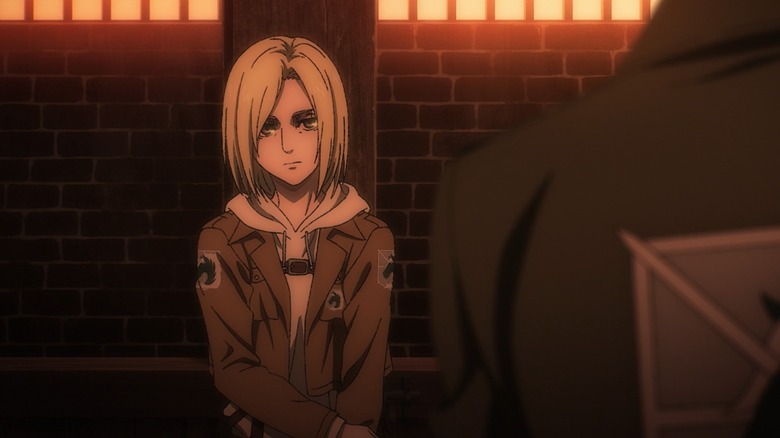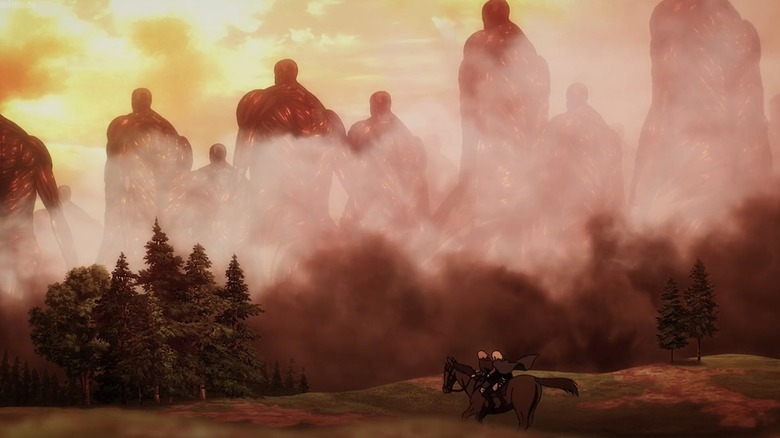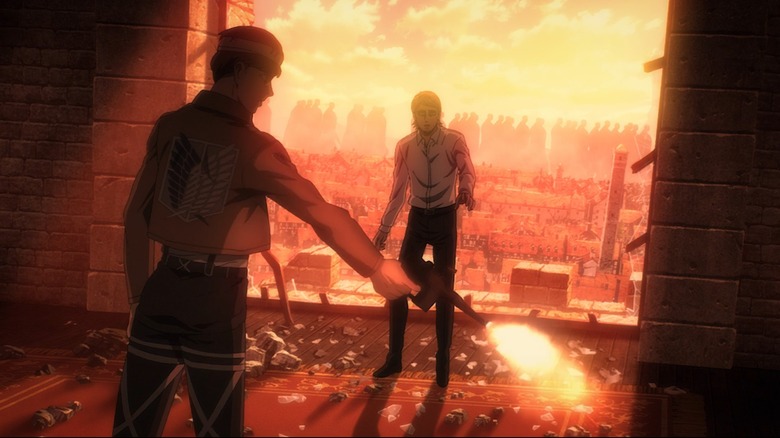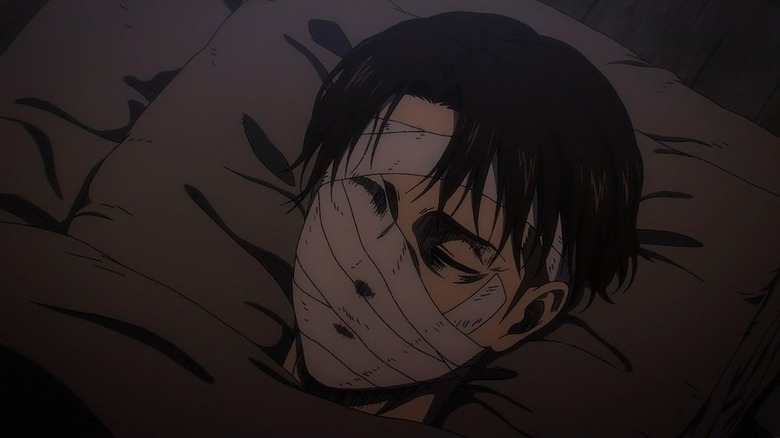Attack On Titan Final Season Sees The Return Of Old Characters And Conflicts In Chaotic And Somber 'Sunset'
After a series of intense episodes full of great action and game-changing twists, it makes sense that "Attack on Titan" would finally slow down a bit to give us a ground-view of the consequences to Eren's actions. That's not to say that the new episode, "Sunset," was a step down or anything; on the contrary, we get some fantastic moments of character introspection and even some big reveals as everyone continues to struggle with deciding what to do in the face of the Rumbling.
One thing is clear in this episode of "Attack on Titan": No matter what happens next, apocalypse or not, war is one thing that never changes.
Would you look at that, more daddy issues
We start the episode with the return of Hitch in the Stohess District, which is back to being a war zone after Eren wreaks havoc in the district once again. There are bodies and destruction everywhere, and there are as many people blaming Eren on the casualties as there are voices crying out that they were necessary sacrifices. There is something utterly terrifying and effective about these post-Rumbling episodes of "Attack on Titan" which never let you forget about the walking apocalypse in the background. In every single scene, you can hear the constant noise of footsteps or see the constant presence of the huge Colossal Titan bodies marching past, truly giving you a sense of the scope of the Rumbling.
Hitch reunites with Annie herself, who is back and as misanthropic as ever. Having spent four years trapped in a crystal cage of her own making, listening to the bickering of Hitch and Armin, it's time for Annie to tell her story. Sadly, this feels a bit redundant, in that there's not a lot we couldn't guess from context or from past episodes. The way she tells it, she was abandoned as a child for being half-Eldian, and was taken in by an Eldian man who — surprise — trained her to be a lethal weapon in order to become a warrior candidate and grant him honorary Marleyan benefits. This is why she never cared about any life other than her own, and why she was always so ruthless; being congratulated for her physical prowess was the only type of praise and affection she knew. That all ended, however, on the day she shipped out for Paradis, as her father apologized for everything he did and wished she could just return home alive.
Annie acknowledges that she did unforgivable things, but she doesn't care about those she hurt, only about returning to her father. This once again reinforces the show's idea that nationalism, loyalty, and idealism are meaningless compared to the urge to fight for those closest to you, for better or worse.
'Humanity will never stop fighting itself until it shrinks to a size of one or fewer'
For the past season now, "Attack on Titan" has pondered the value of preemptive strikes. Was Eren obliterating Liberio to weaken the world's military before they could invade Paradis justified, or good? Is the Rumbling? Though the show has mostly avoided giving us a direct answer, instead providing enough context for the audience to understand why the characters would act the ways they do, "Sunset" does give us a few ideas as to why Eren was wrong to think an apocalypse could solve Eldia's problems.
For one, there's Keith Shadis giving a rather pessimistic piece of advice to the Scout recruits he saved last episode, dissuading them from trying to make a run for it by explaining that they should keep their head down and accept that the Yaegerists are now fully in control. If the recruits try to fight or even just disobey, they'll be killed along with anyone representing the old way of doing things, as Shadis surely will. Instead, he pleads them to wait it out and strike when the time is right. Likewise, we also get a scene where Armin tells Mikasa that he needs to do everything he can to stop Connie from killing Falco, because he needs to be in Gabi's good graces to use her to talk Reiner and Pieck into their side, because after the Rumbling destroys the outside world, whoever controls the Titans will rule Paradis, and they have to avoid a new civil war.
The fact that, even in the middle of an extinction-level event, these characters are already thinking about what conflict will come next calls back to a quote from Erwin back in season 3, in which he talks about violence being inherent to human nature: "Humanity will never stop fighting itself until it shrinks to a size of one or fewer." No matter how many people are left alive after the Rumbling, no matter if they are Eldian or Marleyan, Titan shifters or not, peace will not last forever, and the hatred and violence will not disappear. This is honestly the bleakest and most depressing statement the show has made in quite a while, guiding the audience to spend so much time justifying the actions of the characters and judge whether the losses are acceptable, only to now show that it will all be in vain. Eren may be doing what he's doing because he's trying to save his friends from the outside world, but what happens to them after all that? If there was ever any doubt that "Attack on Titan" would end on any positive or uplifting note, this episode stomped on that idea.
Then we have Floch, the most punchable face on the show and the main reason to feel hopeless about the future of Paradis Island. We see him happily executing the volunteers unless they accept to be subservient to the new Eldian Empire. He also revels in all the death and destruction, because he sees it as a necessary sacrifice to achieve freedom. He tries to convince the other Yaegerists that he should be in charge because he was personally chosen by Eren to be his voice, and he supposedly knew of his plans a whole 10 months prior — but we call B.S. on that. Floch continues to be the face of fascism and idolatry, showing how low people can fall when they start placing all their hope on a single savior, whether it's Eren now, or Erwin back in season 3. It creates an interesting juxtaposition with Armin, who has a full breakdown this episode after he realizes that things are just overwhelmingly complicated and spread out, and lashes out at Mikasa when she asks about Eren, saying he is just too big of a problem for them to handle right now. Armin is still reeling from the decision to bring him back rather than Erwin in season 3, and he struggles to live up to that decision, believing Erwin to be the man who always had a good plan. But we know that's not true: Levi and even Erwin himself said a lot during that third season that all he had were gambles, and the only thing he had in mind was not the good of mankind, but a drunken dream of seeing the truth of this world, everyone else be damned. Floch and Armin were forever changed by the Battle of Shiganshina, and it's a testament to the writing of "Attack on Titan" that those moments can become so essential and important years later.
Not all is lost
Still, from the very first episode of the show, "Attack on Titan" has been about the ways humanity manages to fight in the face of adversity, even if that adversity is of their own making. As bleak as things seem right now, there is some hope.
For one, there's Kaya and Gabi, the personifications of the anime's ultimate message of hope in human reconciliation, as they say their goodbyes and even share a hug. As last week reminded us, and as this episode continues to show, the adults are still stuck in the forest of hatred and violence they made for themselves, but it is the kids who can see the end of the forest and can move past this cycle of violence.
Then there's the final reveal of the episode: The return of Levi and Hange. The latter is just as weirdly awkward and funny as ever, as she plainly stops the Cart Titan in her tracks and asks Pieck and Magath for help. This may be the start of the last alliance that Armin talked about earlier in the episode, the last hope of transcending conflicts and borders and ... what? Stopping Eren? That may solve a few things, but as this episode showed, the Titans are just a red herring, and war? War never changes.



